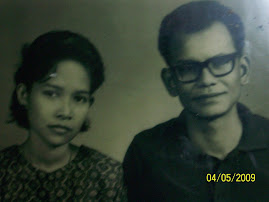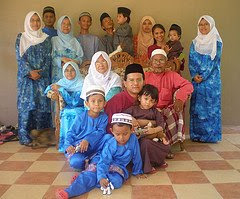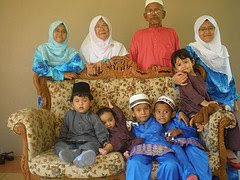 Assalamualaikum,I stumbled upon this article in one of the blogs that I frequent. I love the simplicity of the article. It is full of insights that I believe very useful to you too. One of these days, I hope you will become a leader in your area of choice, and insyaAllah you should demonstrate all these qualities. From my experience there are not many leaders, only bosses, that constantly have all these qualities. In fact the opposites are more obvious. Maybe the inferiority feelings that one have that overule the true color of a leader. It's so frustrating that at times you feel that no one really cares, appreciate and value your capabilities.Anyway, my doa that anak-anak ibu will not turn out to be tyrants, nauzubillah.Love you always,Ibu.
Assalamualaikum,I stumbled upon this article in one of the blogs that I frequent. I love the simplicity of the article. It is full of insights that I believe very useful to you too. One of these days, I hope you will become a leader in your area of choice, and insyaAllah you should demonstrate all these qualities. From my experience there are not many leaders, only bosses, that constantly have all these qualities. In fact the opposites are more obvious. Maybe the inferiority feelings that one have that overule the true color of a leader. It's so frustrating that at times you feel that no one really cares, appreciate and value your capabilities.Anyway, my doa that anak-anak ibu will not turn out to be tyrants, nauzubillah.Love you always,Ibu.
What Makes A Strong Leader? The Power of the 99 Names
By Abdul Aziz Said Mohammed Said Farsi
Chair of Islamic Peace Director of the AU Center for Global Peace.
What makes a leader?
People say they want strong leaders. But what qualities make a strong leader who is truly good and beneficial for a community?
From a traditional Islamic and Arab perspective, being a good leader meant following true guidance and developing noble traits in the self through the emulation of divine qualities.
When the divine qualities,
Asma’ Allah al-Husna (the 99 Beautiful Names of God) were invoked in the name of a person, that person was often called the servant of the quality: hence the name Abd ul-Rahman (Servant of the
Compassionate) and not just
Rahman. A person who excelled in the service of a divine quality was a true leader of the people.
How do we begin? Contemplation of divine qualities as expressed in the Asma’ Allah al-Husna provides a template and a model for reflection both for personal training and for the effort to actualize the highest values of the community. Where these are present, the essential prerequisites emerge to inspire the confidence, support, and cooperation of a community that rewards leadership with the dynamism and unity needed to envision and achieve a collective destiny.
Leadership is Empowerment
Being a leader involves being a representative both of leadership qualities and of people. A leader models leadership qualities by speaking and acting respectfully toward everyone. To be a true statesperson, one must also be an accomplished facilitator. The leader as facilitator is a compelling example of the quality of
al-Malik, the Possessor of Power or Sovereignty. Politics and leadership always involve power, but power for what purpose? A leader, in the fullest spirit of generosity (emulating
al-Wahhab, the Bestower,
al-Razzaq, the Provider, and
al-Muqit, the Maintainer), is one who owns power in order to empower others. This power manifests
al-Qadir, the All-Powerful.Yet, what actions are connected to such power? Moral leadership is the ability to inspire or awaken (
al-Khabir, the One Who is Aware) people to their innate potential. A leader provokes people to act, and act toward proper ends, that are ultimately for the good of the whole community. With the responsibility of empowerment, he or she awakens and encourages people, both men and women, to fully participate in society at all levels (social, moral, economic, and political) and to form and develop their own accounts of social reality. In doing so, a leader then becomes a witness (
al-Shahid, the One who bears witness) to the societal processes through diligent observation of his/her own actions and environment (
al-Raqib, the Ever-Watchful,
al- Hasib, the One who takes into Account, al-Muhsi, the Accountant).Clearly, a greater leader needs to be an effective politician (a good strategist and tactician), but this needs to be in service of moral statesmanship, not personal and momentary advantage (
al-Ghani, The Rich, for he or she has no desire, and al-Mughni, One who does not need). A variety of characteristics describe such a moral stature (
al-Majid, Nobility, al-Jalil, Majesty, al-Azim, Dignity or Excellence).When wisdom for the need of the community calls on tough and forceful action, the leader must be tough and forceful (
al-Aziz, Mighty, al-Jabbar, the Repairer, al-Qawi, the Strong, al-Matin, the Firm in Resolve).Leadership requires more than the elites merely adopting a mood of optimism or generating fear of the future. Leadership requires action and intention. In order to balance the siffat al-jalaliyyah, qualities of Majesty, a leader also needs to develop siffat aljamaliyyah, the qualities of beauty.
History shows us that the loyalty inspired by leaders who demonstrate mercy and compassion are profound. Other qualities linked to rahma are
al-Latif (the Gentle), al-Halim (the Clement), al-Karim (the Generous), al-Wadud (the Loving), al-Ra’uf (the Kind). Empathetic consciousness enables a good leader to forgive and spread the habit of forgiveness to others
(al-Ghaffar, the Forgiver, al-Ghafur, the All-Forgiving, al-‘Afu, the Pardoner).Guardian of the Public Interest
A greater leader becomes a guardian of the public’s interests (
al-Mumin, the Guardian of Faith). He or she protects (
al-Muhaymin, the Protector, and al-Wakil, the Solver of Problems, and al-Hafez, the Preserver). As spokesperson, he or she embodies visionary leadership and seeks to represent all of the people. The subtle relationship between power and influence, between executive image and agenda setting is constant and dynamic.
To effectively lead, it is a necessity that a leader inspires mutual trust, and this requires the ability to be a good communicator: the leader’s view must be all encompassing
(al-Wasi, the All-Embracing, and al-Basit, the Expander). This means that leaders must be very good listeners
(al-Sami’, the All-Hearing) and fine observers (
al-Basir, the All-Seeing). To hold vision is to be a mapmaker: to see that all of the old maps are out of date, and that we do not yet have new, good and reliable maps. In order to invent our own maps, with all the skills that doing so accurately and compassionately require, leaders need both humility and dignity (which may be linked to
al-Shakur, the Thankful, and al-Hamid, the Praiseworthy).Leadership demands vision. Why vision? Vision avoids drift and selfcenteredness, it mobilizes the energy and imagination of the people, and it widens and deepens the sense of mutual responsibility while articulating what is possible and demanding discipline, sacrifice, and the capacity to dream.
Leaders need vision that has faith
(al-Mu’min, the Faithful) and wisdom
(al-Alim, the All-Knowing). Like power, leaders do not need wisdom for themselves alone, for they possess the courage and strength to be able to share it. One cannot be an effective representative without finding and facilitating creative ways to prioritize and balance all the interests of the people and groups in a fair and inclusive way on the basis of wisdom
(al-Hakim, the All-Wise), which is both principled and practical, far seeing and yet focused on meeting the issues of the moment in a fair (and just) and balanced (
in al-Hakam, the Judge, wisdom is connected to the sense of having good judgment). A successful nation needs a broad public dialogue, with a great variety of suggestions and opinions, and not only consultation. “Justice” (al-‘Adl) itself is a dynamic and not merely static or purely legal concept. Justice is embodied in the “rolling consensus” of people for more democracy, more equality, more opportunity, and pride in one’s community and tradition, above all perhaps – for more of a sense of community.
From Leadership By Force To Leadership By Consensus and Cooperation
Building a system of good governance must begin with good leadership – from the outset this means that the character and education of leadership is crucial.
Through working such qualities as
al-Hadi, the Guide, al-Rashid, the Guide to the Right Path, and
al-Warith, the Inheritor, a greater leader seeks to fulfill the sacred trust to inspire and empower the whole community. This trust is essential for health, vibrancy and the long-term sustainability of an untied and prospering community.
True leaders are consensus builders (
al-Muqaddim, the Expediter). They work to build mutual trust and agreement on principles of fairness among their people, as a basis for cooperative efforts in which all have some expectation of shared benefit (
al-Barr, the Source of All Goodness). Since no one party can force any of the others to cooperate, and since each one has a selfish temptation not to cooperate, each must trust the others not to take advantage of both the opportunity and the temptation to cheat.
Cooperation requires, then, mutual expectation of a willingness to sacrifice short-term self-interests for the common good (
al-Jame’, the Gatherer).
While having shared objectives that benefit all is a necessary precondition for cooperation, it is not sufficient. There is a crucial role for leadership at each stage in the confidence-building and community-building process
(al-Salaam, The Source of Peace): forming common goals, establishing mechanisms for cooperation, ensuring that efforts will be coordinated, determining the fair allocation of benefits and burdens, and identifying the roles and responsibilities of the various actors in the cooperative enterprise. Leadership is needed to promote solidarity without which the highest values of the community do not manifest and underlying norms of fairness and reciprocity cannot be effective. When cooperation is achieved, however, a greater leader will be known as a good friend (
al-Wali, the Protecting Friend).A greater leader who embodies the qualities represented by the Asma’ Allah al- Husna is a democratic leader, in the true sense of democracy as a form of collaborative and participatory communal governance. Just as positive character cannot be imposed but must rather be consciously cultivated, so it is with democracy.
Democracy cannot be successfully implanted from the outside. It is an indigenous and delicate flower that only flourishes when deeply rooted in the dreams and hopes of the great majority of a nation.
Democratic behavior is a learned behavior, and democracy is only learned by practice.













